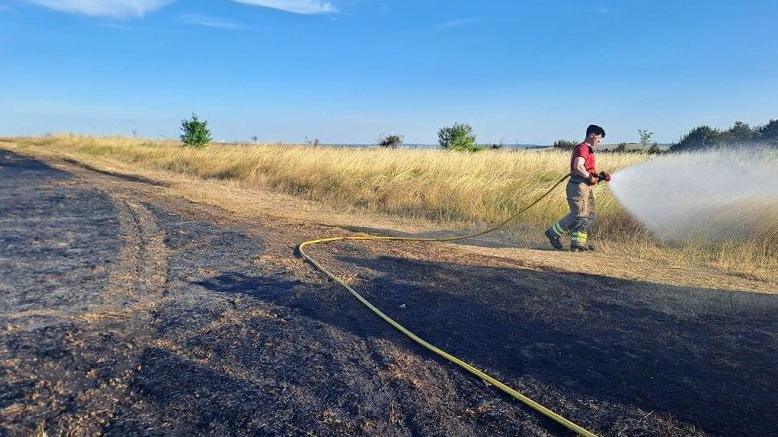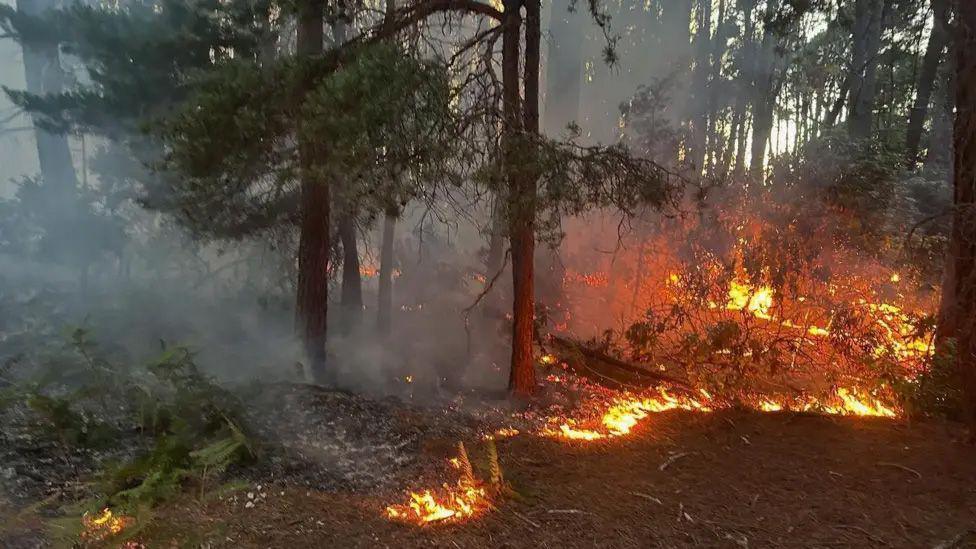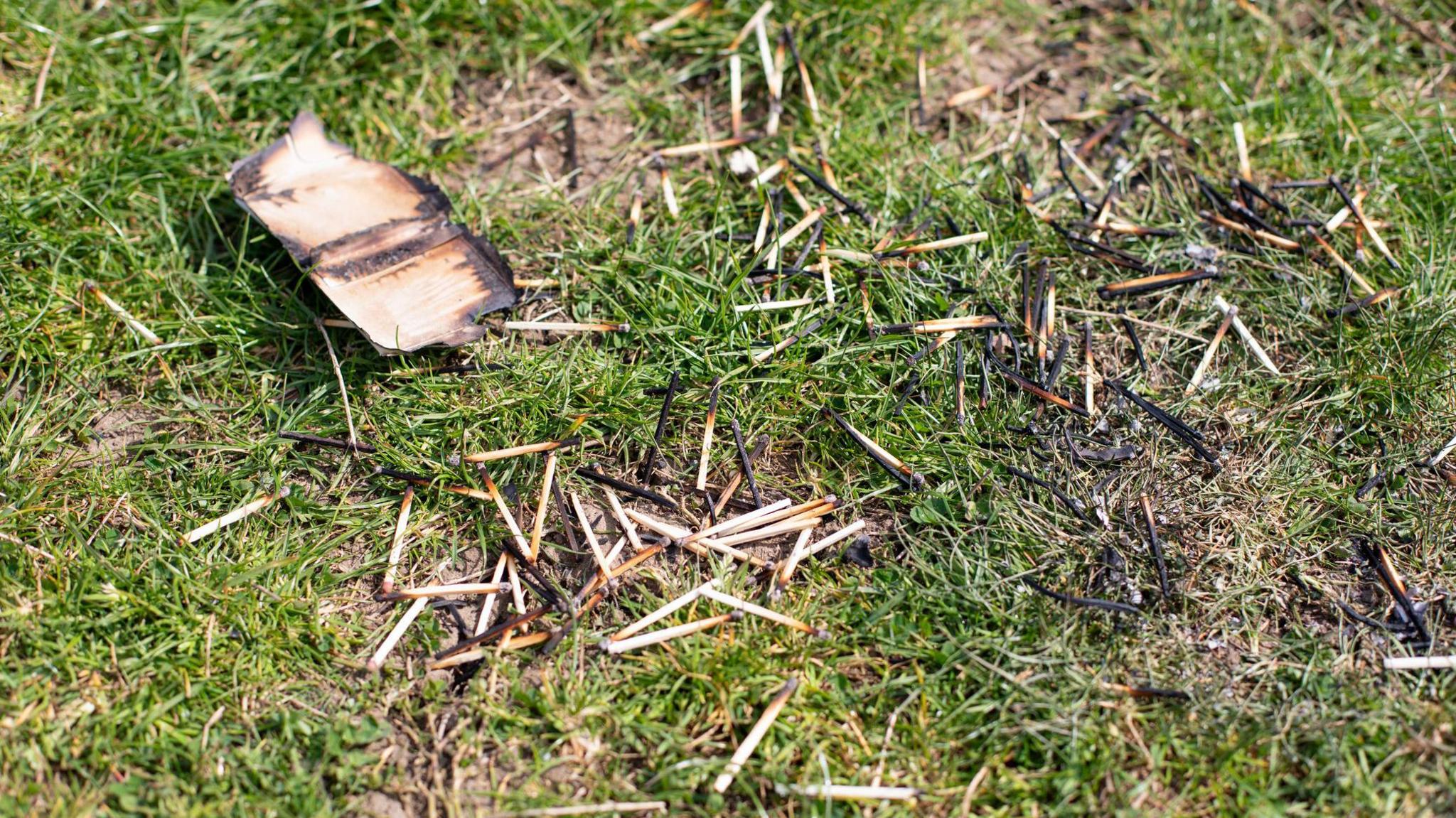Wildfires: Fire brigades tell Newsround about dangers of deliberate fires

- Published
In a summer of record numbers of wildfires, fire brigades have spoke to Newsround about the dangers of people setting fires deliberately.
Most fires in the UK are caused by human activity and previous figures have suggested that around a third of all fires are deliberately started.
Wildfires are worse during the summer because the hot dry weather means they can spread easily through dry grassland and woodland.
Two fire brigades told Newsround that they see more deliberate fires during school holidays.
Andy Evans, of the joint Arson Task Force for Fire and Police in Northamptonshire, warned young people to "consider the risks before doing something that may seem harmless. You could be putting not just yourself, but also your friends, family and the general public in serious danger."
- Published17 September 2024
- Published1 July
- Published22 September 2024
Why do wildfires happen in the UK?
In England and Wales alone, crews have already tackled 856 wildfires this year (as of 12 August), the National Fire Chiefs Council (NFCC) said.
This is higher than the record-breaking totals seen in 2022 and six times the number recorded last year.
Fires in Dorset and Wiltshire this week saw a major incident declared, with over 100 firefighters tackling one blaze.
A blaze near Llandudno in North Wales has seen fire crews battling flames for a second day.
While in North Yorkshire, a major incident was declared by North Yorkshire Fire and Rescue Service two weeks ago when a fire broke out on Langdale Moor.
The fire flared up again on Tuesday (25 August), and firefighters are still working to contain it.
What causes wildfires?
A wildfire is an uncontrolled outdoor fire that burns things like grass, woodland and other vegetation.
While wildfires can occur naturally, in the UK most wildfires are the result of human action.
The National Fire Chiefs Council (NFCC) says these actions can be put into four groups:
Littering, such as a cigarette which hasn't been put out
Unattended fires, such as bonfires, barbecues or campfires
Controlled burning - for example to manage land - which then gets out of control
Deliberate fire starting
Fires are worse in summer because the hot dry weather means any vegetation can catch fire easily and the fire can spread quickly.
Climate change, which means longer and drier summers, is likely to mean an increase of wildfires in the UK and across the world.
Fire brigades warn against deliberate fires

This fire at a nature reserve near Poole is believed to have been started deliberately
A number of fire brigades have put out warnings against lighting deliberate fires.
This is also known as arson, which is the criminal act of deliberately setting fire to something.
Andy Evans, of the joint Arson Task Force for Fire and Police in Northamptonshire, told Newsround:
"We do tend to see a rise in deliberate fires as we move into the summer months and the school holidays."
The London Fire Brigade (LFB) says since the start of June, nearly 80 fires in locations such as open grassland, woodland, parks and other green spaces, have been recorded as deliberate.
They also told Newsround there is an increase of fires in green spaces in the summer holidays, some of which they believe are started deliberately.
The LFB told Newsround:
"Deliberately setting fires can cause a lot of damage to nature and wildlife. With the hotter and drier weather we are having as a result of climate change, any fire, regardless how small, can quickly spread causing buildings and houses to catch light."
How can we prevent wildfires?
Andy Evans, from Northamptonshire Fire and Rescue Service (NFRS), also had a message for young people and children:
"Setting a fire might seem like it can be harmless fun, but they can get out of control very quickly, particularly in the dry conditions that we currently have.
"Fires that spread this quickly can put animals and other people at risk of serious harm.
"If you set a fire, you are also exposing yourself to potentially be burned or inhale smoke into your lungs.
"It also means that our fire crews might be needlessly called away from their stations, and leave them unable to respond to other incidents where lives might be at risk.
"So we would urge young people to consider the risks before doing something that may seem harmless."

Some fire brigades say there are more deliberate fires during the school holidays
Both Northamptonshire and the London Fire Brigade have programmes which specifically work with children and young people who play with fire or have set fires.
Andy says these projects explore what can happen to young people who deliberately set things on fire:
"The Fire Service visits schools so that we can educate young people not only of the dangers of fire setting, but the potential impact it can have on your future and job prospects if you have a criminal record for arson."
